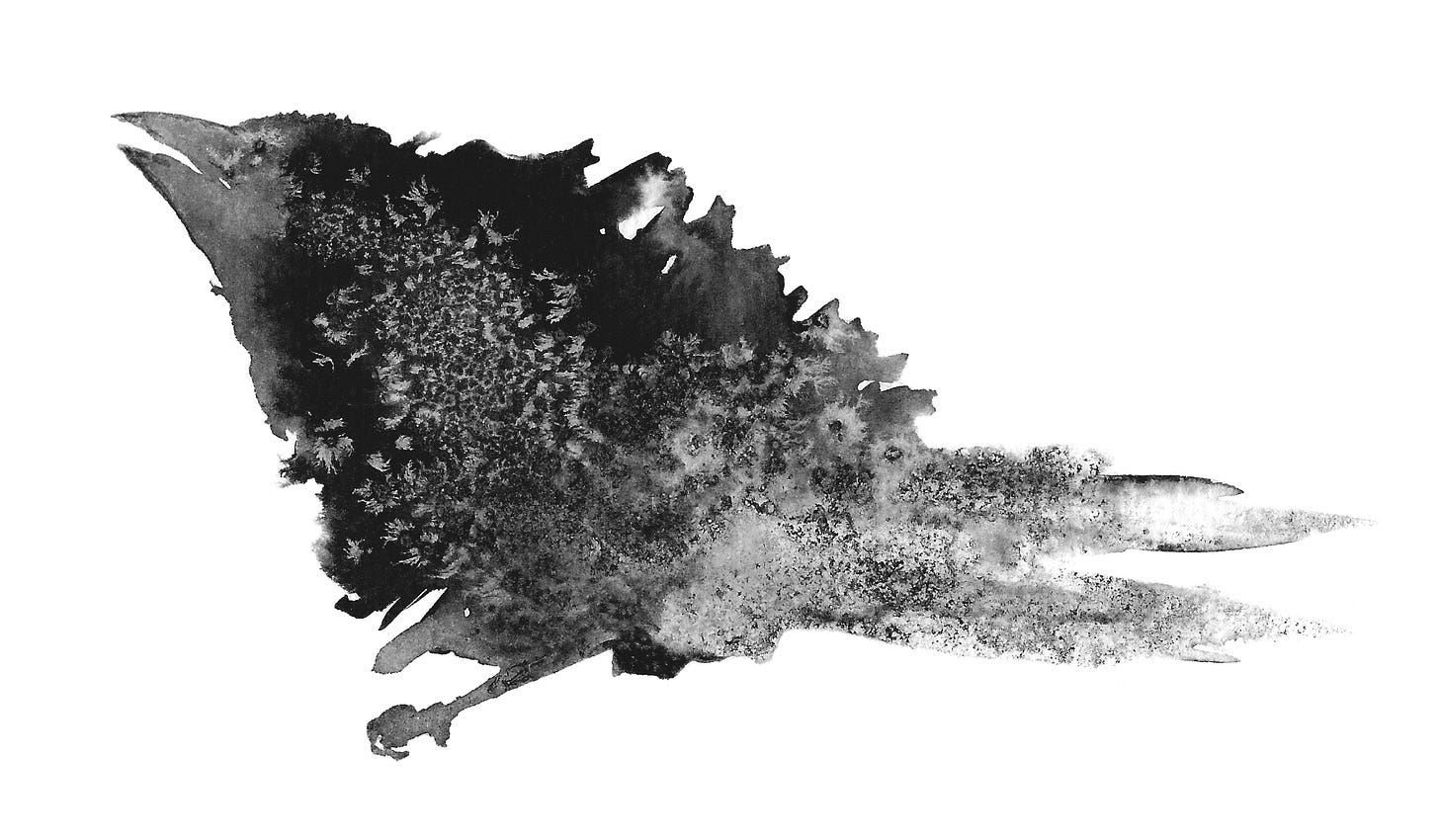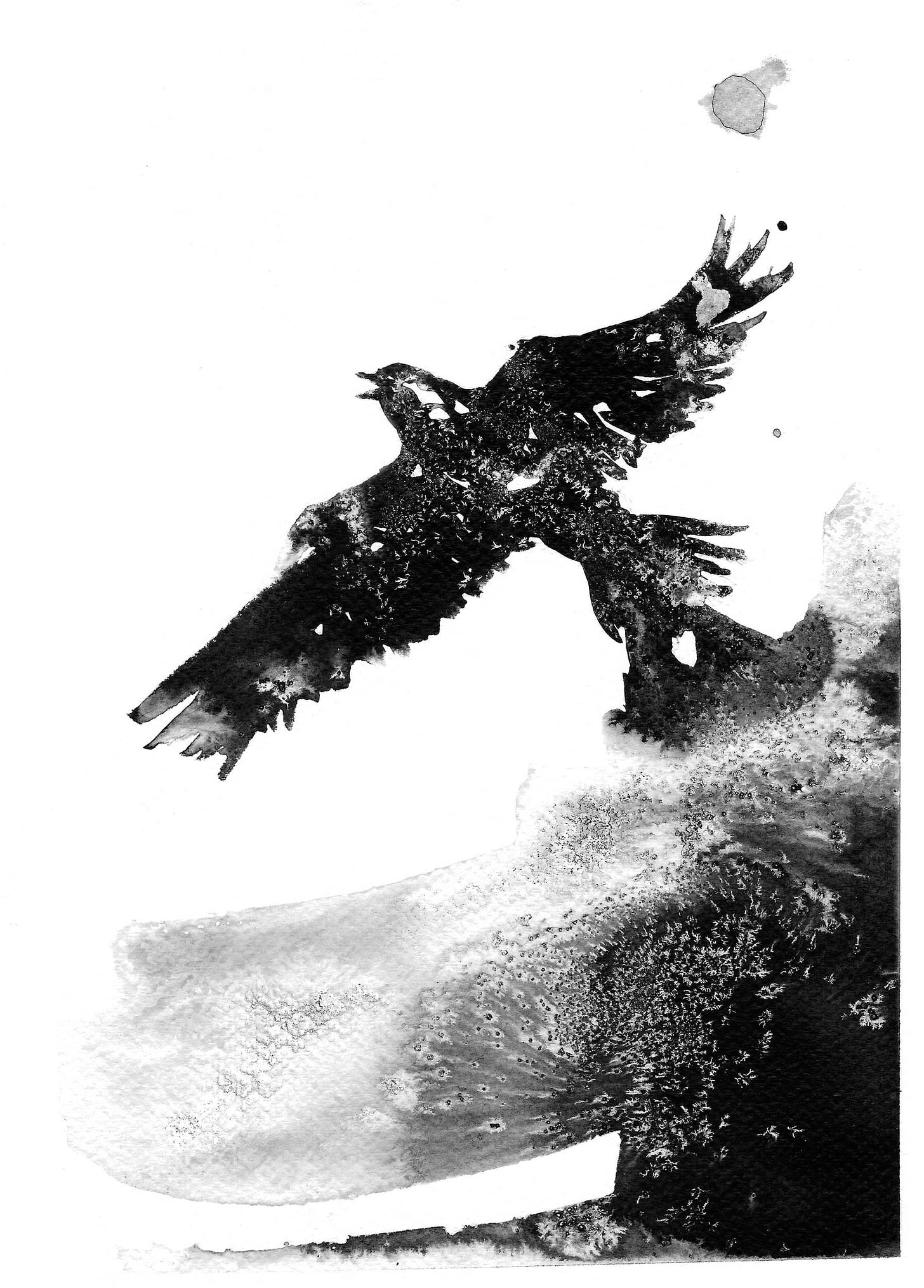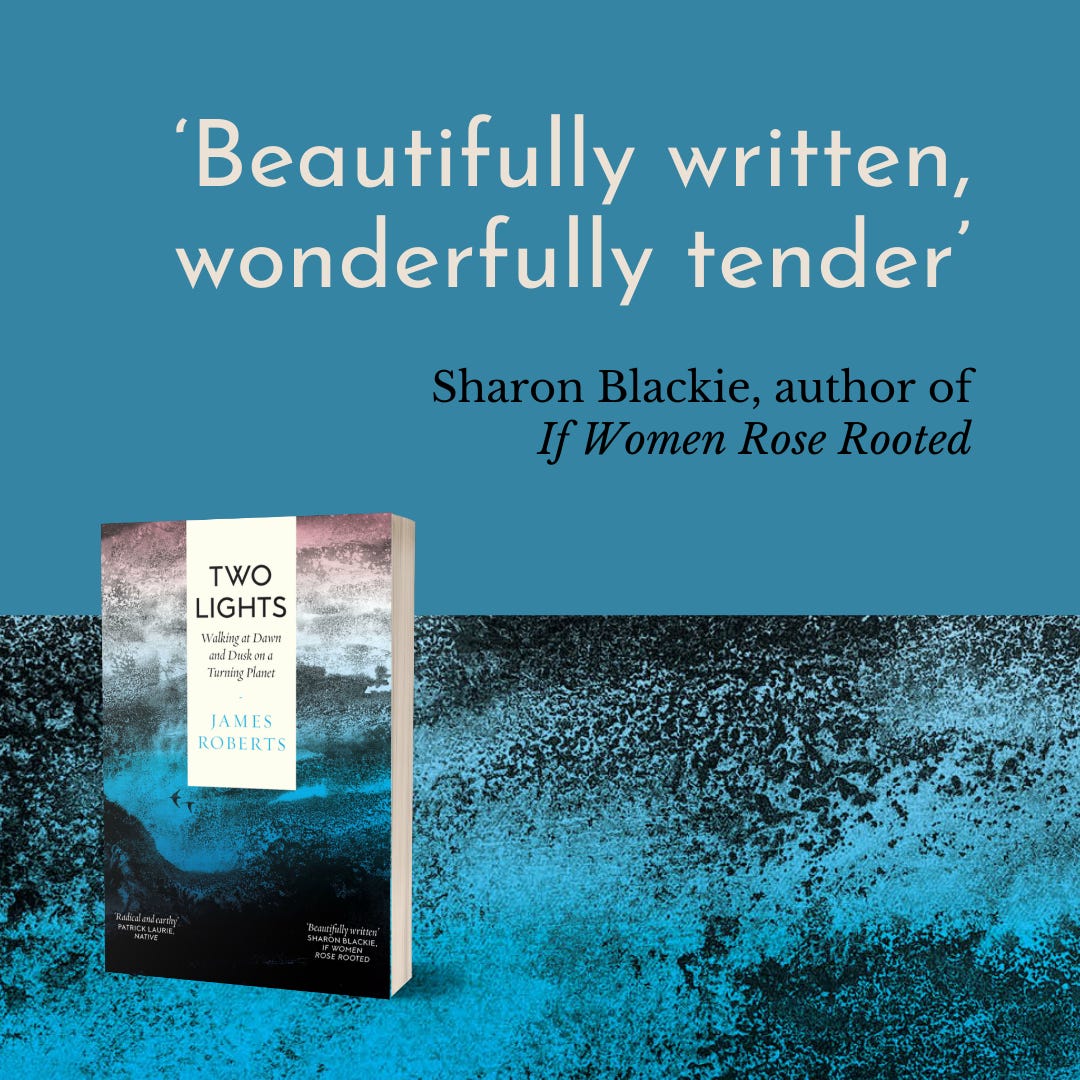One morning last week I woke late and stumbled down the stairs to the kitchen, through the deep fog that gathers with too much slumber. My glasses had fallen down the side of the bed and the world was a blur. Light poured in through the smudged rectangle of the window. There were obstacles on the floor, shoes perhaps. I couldn’t read the clock hands. Two dogs wriggled around me, desperate to pee, frantic to run, rushing about while I ladled half a pot of yoghurt into a bowl, added blueberries, ate a banana, drank the remains of a mug of cold hibiscus tea. In record time I opened the back door and the dogs cantered into the yard, where they both stopped dead, heads bowed. On the stones in front of them was the tiny bedragled body of a sparrow fledgling. The dogs sniffed at it and looked up at me as if to ask if it was time to eat or pray.
It’s late May, the time of year when some unfortunate fledglings leap from the nest unprepared for the sky life. They flutter and flop downwards, landing on the ground. Parent birds go into a shrieking panic as the young they’ve fought to raise in a blur of weeks scrabble for cover, trying to avoid bicycles, cars, human feet, cats, foxes, hawks and crows. Many fail, as had the little sparrow. Only the previous afternoon I’d watched my next door neighbour’s underdeveloped and wheezy black moggy being mobbed by two sparrows who continually dive-bombed it from their perch on the telephone wire connected to our house. The cat escaped through a broken catflap and didn’t reappear. But there are other, more sinister and determined felines in the area.
I lifted the sparrow by the tail and held it up for a moment, cradled it in my palm, stroked its wings. It was just two ounces of feather and bone, a few drops of blood, a morsel of muscle. Years ago I had a ritual prepared for when this happened. I’d hold the creature up to the sky, whisper to it: “Go back to the fire little one”. Then I’d dig a hole in a quiet spot in our garden, beneath a silver birch tree which was always the place of the birds. We’ve moved since and we only have a tiny, stone paved yard now. To my shame I’ve been known to put dead birds into a bag with the rubbish. The thought of the little thing rotting down next to various unrottable plastics, chemically impregnated food waste, fingernail cuttings and broken implements seems deeply wrong. So this time I placed the sparrow gently on the ground beneath a black hollyhock growing glorious and funereal from the bottom of an old stone wall near our garage. It would become food for the miraculous. I then spent several hours chasing our cat away from it. Later the little bird disappeared. Maybe it had finally learned how to fly.
I have little affection for magpies. They’re as crafty as all corvids and as gluttonous, but with none of the sparkling wit of ravens or rooks. They pluck blind sparrow chicks from the most carefully camouflaged nests and gobble them down whole. They fight like drunks and fill the woods with cuss words. But one of the saddest things I ever saw was driving past the spooky old house on the lane into Kington when a pair of magpies flew out in front of the car in total misery as their fledgling fell and landed in a cat’s mouth and was then carried off alive to be slowly torn to pieces. The parent birds raged and wailed, utterly inconsolable as their child quietly and confusedly went out of this world. If you don’t think birds have emotions you’re very wrong.
May is the month of celebration and mourning. So much life comes into the world, then, only weeks later, slips back into the fire. I was only a month old in my first May. A human baby seems to hover between worlds in its first few weeks, so tiny and fragile are they, so birdlike. My eldest son came into the world a month premature and had a difficult birth. When the nurse handed him to me it seemed as if I was staring into the face of someone very old and fragile. He was feather boned, frowning, bruised, in pain. His hands were tiny and curled, his knees like a stork’s. His cry was so high pitched it seemed as if it should come from the trees or sky. His first few weeks were scary. He was placed in special care in an incubator, along with several other premature babies, all curled in transparent nests, watched over by nurses and frantic parents. Some of those little birds were so tiny you could have fitted them in the palm of your hand. After a month he’d gained the required weight and was healthy. He’d passed over the threshold into the world.
The fledglings are learning to sing . There are two parts to this, the sensory and sensorimotor phases. In the sensory phase the young birds are simply listening and trying to memorise the calls of adult birds. In a woodland filled with the songs of many species you’d think this would be difficult, but birds have an internal response to conspecific song, their heartbeats speed up. Even birds who only hear heterospecific calls in their early months, though initially producing babbling song, will, on hearing the calls of their own kind as adults, develop their own voices to match. Once song is memorised the infants will then begin the sensorimotor phase, initially singing quietly and clumsily, practicing over and over until they can mimic perfectly the songs of their parents and cousins. In this way they are identical to human babies. I remember our sons doing this when they were only a few months old. Though they were obviously unable to shape words they could copy the changes in tone in my wife’s voice. Oooohs and ahhhs were mimicked briefly before they went back to babbling. This phase came long before they were able to copy hand motions like clapping and waving. Song, therefore, is our first cultural response. First you feel it, then you sing.
How much birdsong do I fail to hear; how many of the earth’s colours do I fail to see; how much that can be touched do I not feel? These are good questions to ask. And you could continue this line of thought with the following statement, which I’m sure is one of the rules of life: The more you sense the more you feel - the less you sense the less you feel.
It’s why we’re where we are now, with our relationships to the wild, and to each other, continuing to decline. The wild things come into the world, they sing for a time then disappear while, for us, a wholly manufactured and unfelt version of life encroaches. The levees of our senses have been breached.
Another question: If you forget to kiss do you forget how to kiss? Do you eventually forget what a kiss is?
Only three weeks to go . . .
. . . until the paperback edition of my book Two Lights - Walking at Dawn and Dusk on a Turning Planet is published. Pre-orders make a big difference to the book’s visibility with booksellers. If you’d like a copy do consider ordering yours now, and I will love you forever!
Solstice Sidetrack
It’s the solstice today. You’ll be able to watch footage on Instagram and Youtube of people gathering in strange clothes at henges and stone circles here in England, waving fantastical implements, chanting in languages that don’t even exist, and dancing terribly. I wish them all well. I too will be celebrating in my own unassuming way, getting up at 4am and walking to the top of Hergest Ridge to watch the red glow in the east. I’ll give blessings, quietly. I’ll pause and try to feel the turning of the earth. Most importantly, for the whole day I’ll listen to the birds, who, in this half of the world, will sing longer than on any other day. And that’s their great gift to us all.
Here’s a short video reading from Two Lights to remind us that a sense of the sacred is felt and honoured by our cousin species.






James, I can answer your last question. Many years ago, and I remember this clearly, I was considering something deeply and while doing so, I was unconsciously brushing my lips over my right shoulder. And then, without thinking, I dropped a kiss on my own shoulder! I immediately felt highly self conscious and embarrassed -- nobody was watching me, but who does that?? -- and also perplexed. Now I think It was a completely spontaneous and instinctive reaction to the sensation of something pleasant against my lips. It's like when you hold your baby in your arms and inhale his scent and move your lips over the soft down of his head, you can't help but kiss it. So, no, you don't forget how to kiss or what a kiss is :-)
James, you’ve folded grief, awe, memory, & biology into something so soft-footed it doesn’t feel like an essay at all, but a sitting-with. The sparrow, your son, the hollowness of May—it all echoes. I love that you didn’t rush the final question, either. That line about the levees of our senses being breached—yes. That’s exactly it. We’re more exposed than ever, yet feeling less. Beautiful.